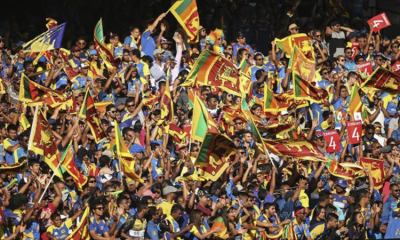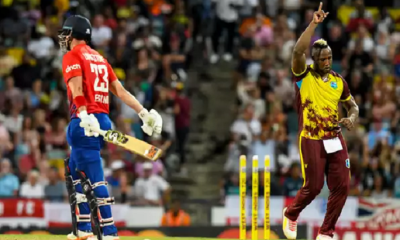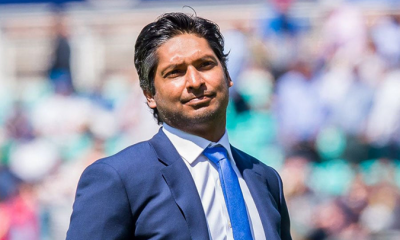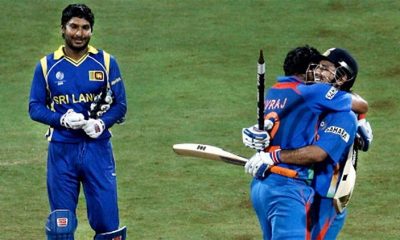Latest News
Stop-clock trial begins with T20I series between West Indies and England
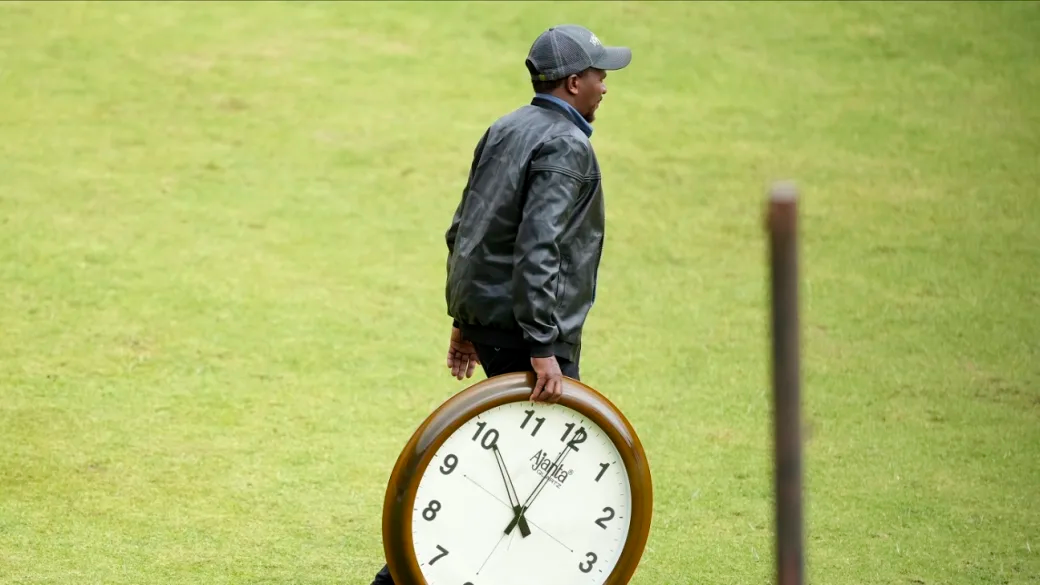
The first T20I between West Indies and England on Wednesday will see a stop clock used for the first time in international cricket. Part of a six-month experiment announced last month by the ICC, the stop clock will aim to restrict the time taken between overs and quicken the pace of play.
The bowling team will need to be ready to bowl the first ball of their next over within 60 seconds of the previous over being completed. After two warnings, a third default by the bowling side will result in a five-run penalty imposed against them.
As it stands, the stop clock will be used only in men’s ODIs and T20Is and goes one step further from the ICC’s change in playing conditions from 2022 where slow over-rates would force fielding sides to keep one fewer fielder outside the circle in the final over of a game. These in-game sanctions are in addition to any monetary fine that teams have to pay for slow over-rates under the ICC’s playing conditions.Stop clocks aimed at speeding up play are not new in sport. In major tennis tournaments, a player gets 25 seconds to get ready to serve between points. The idea of a stop clock in cricket was proposed in 2018 by the MCC’s World Cricket Committee that included Ricky Ponting, Saurav Ganguly and Kumar Sangakkara, among others, to reduce the ‘dead-time’ between overs in international games.
The five-match T20I series between West Indies and England runs from December 13 to December 22, with the sides playing the series opener in Bridgetown, then moving to St George’s for two fixtures and finishing the series with two matches in Tarouba.
(Cricinfo)
Latest News
Former state minister arrested by CID

It has been reported that former State Minister Sivanesathurai Chandrakanthan alias ‘Pilleyan’ has been arrested by the Criminal Investigation Department (CID).
Latest News
Maintaining public trust is a fundamental responsibility of the Police Department – President

Attending the passing out parade of the 82nd batch of the Special Task Force (STF) at the Katukurunda STF Training Camp in Kalutara on Monday (07), President Anura Kumara Disanayake emphasized the need for a progressive transformation within the Sri Lanka Police to ensure the rule of law, order and authority.
The President noted that the public places its trust in the Sri Lanka Police to uphold the supremacy of the law and maintaining that trust is a fundamental responsibility of the Police Department.
Addressing the newly commissioned officers, President Disanayake stated that how one serves and respects their profession is reflected in their career and urged the officers to embrace their professional duty in a way that contributes meaningfully to the transformative change the country requires.
Highlighting the current state of institutional breakdown in many sectors, the President pointed out that the people have already initiated change by altering the political authority, but reiterated that political transformation alone is insufficient. Instead, a comprehensive and positive transformation across all sectors is necessary for national progress.
The President further emphasized that new police officers carry the responsibility of meeting public expectations. He called on them to ensure public safety and security and to prevent the nation from falling prey to organized crime and drug-related issues.
He also stated that the younger generation must take responsibility for the motherland, bearing that duty on their shoulders and should strive to steer both their personal future and the future of the country in a positive direction.
President Disanayake concluded by saying that joining the regular service of the Sri Lanka Police today should be remembered by all as a significant and powerful step forward.
The President further noted that the service rendered by the Special Task Force (STF) on behalf of the public during times of emergency and disaster is highly commendable.
A total of 118 newly recruited Sub-Inspectors and 231 Probationary Police Constables who successfully completed their basic training graduated during the ceremony.
President Anura Kumara Disanayake awarded certificates and honours to officers who demonstrated exceptional performance during the training programme.
A commemorative token was also presented to President Disanayake, who attended the ceremony as the Chief Guest.
An operational demonstration by STF officers on a simulated battlefield was presented as part of the event.
Established in 1983 under the theme “Victory is Certain”, the Sri Lanka Police Special Task Force is currently recognized as a prestigious unit deployed for VIP protection, crime and organized crime suppression and narcotics control efforts aimed at building a drug-free nation.
The ceremony was attended by Minister of Public Security and Parliamentary Affairs Ananda Wijepala, Minister of Health and Mass Media Dr. Nalinda Jayatissa, Deputy Minister of Public Security Sunil Watagala, Secretary to the Ministry of Public Security Ravi Seneviratne, Acting Inspector General of Police Priyantha Weerasooriya, STF Commanding Officer Senior Deputy Inspector General of Police Samantha de Silva, along with other senior police officers, the parents of graduating officers and other invitees.
[PMD]
Latest News
National minimum monthly salary for private sector employees raised to Rs. 27,000/-, minimum daily wage to Rs. 1080/-
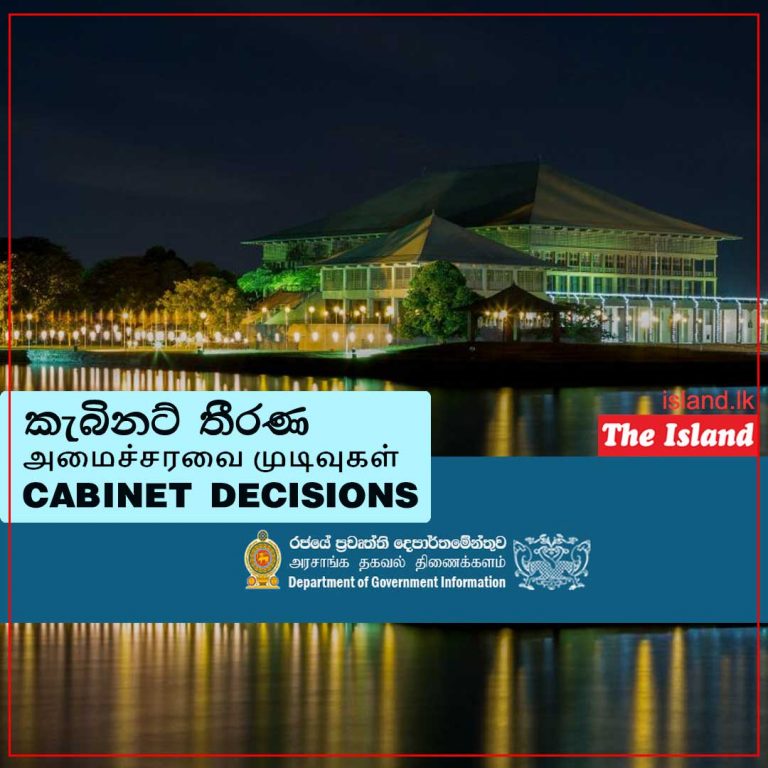
Parallel to salary hike of public sector officers by the budget proposals 2025, it has been proposed to increase the salaries of private sector employees as well.
Accordingly, the Cabinet of Ministers granted approval to the proposal submitted by the Minister of Labour to revise the national minimum monthly salary and national minimum daily wage and follow other legal actions as follows:
• To raise the minimum national monthly salary by rupees 9,500/- from rupees 17,500/- to rupees 27,000/- with effect from 01.04.2025
• To raise the minimum national daily salary by rupees 380/- from rupees 700/- to rupees 1,080/- with effect from 01.04.2025
• To raise the minimum national monthly salary by rupees 3,000/- from rupees 27,000/- to rupees 30,000/- with effect from 01.01.2026
• To raise the minimum national daily salary by rupees 120/- from rupees 1,080 /- to rupees 1,200/- with effect from 01.01.2026
-

 Business2 days ago
Business2 days agoColombo Coffee wins coveted management awards
-

 Features3 days ago
Features3 days agoStarlink in the Global South
-

 Business4 days ago
Business4 days agoDaraz Sri Lanka ushers in the New Year with 4.4 Avurudu Wasi Pro Max – Sri Lanka’s biggest online Avurudu sale
-

 Business5 days ago
Business5 days agoStrengthening SDG integration into provincial planning and development process
-

 Business4 days ago
Business4 days agoNew SL Sovereign Bonds win foreign investor confidence
-

 Sports6 days ago
Sports6 days agoTo play or not to play is Richmond’s decision
-

 Features3 days ago
Features3 days agoModi’s Sri Lanka Sojourn
-

 Sports5 days ago
Sports5 days agoNew Zealand under 85kg rugby team set for historic tour of Sri Lanka

